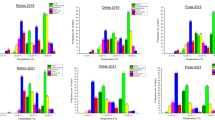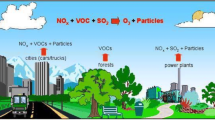Abstract
A PM2.5 crisis in Thailand has caused the Thai government and public to be increasingly concerned about children’s exposure to PM2.5 during time in school. This study is a part of a project to create a modeled effective school indoor air quality management for the Bangkok Metropolitan Administration (BMA). We measured air quality and environment in 10 Bangkok school rooms, including CO2, CO, O3, PM2.5, PM10, TVOCPID, formaldehyde, airborne bacteria and fungi, and gaseous organic contaminants. The indoor-to-outdoor concentration ratios indicated that either outdoor sources or indoor + outdoor sources were the predominant contributors to PM in naturally ventilated classrooms. Meanwhile, PM levels in air-conditioned classrooms strongly depended on class activities. CO2 measurements showed that the air-conditioned classrooms had a low 0.4 per hour air change rate and total fungal counts also reached 800 CFU m−3. Analysis of gaseous organic compounds showed that the two most abundant were aliphatic and aromatic hydrocarbons, accounting for 60% by mass concentration. Interestingly, 2‐ethyl‐1‐hexanol, a mucous membrane irritant, was detected in all study rooms. In one naturally ventilated classroom, we implemented a positive pressure fresh air system to mitigate in-class PM levels; it kept PM levels below 20 μg m−3 throughout the class day. Students reported a 20–37% increase in satisfaction with the perceived indoor environmental quality and reported reduced rates in all symptoms of the sick building syndrome after implementing the positive pressure system.








Similar content being viewed by others
References
Ahn K (2022) The detrimental effects of phthalates on allergic diseases. Allergy Asthma Immunol Res 14(3):285–288. https://doi.org/10.4168/aair.2022.14.3.285
Allen JG, Bernstein A, Cao X et al (2017) The 9 foundations of a healthy building. Harvard T.H. Chan School of Public Health, https://forhealth.org/9_Foundations_of_a_Healthy_Building.February_2017.pdf. Accessed 13 May 2023
Asadi E, Costa JJ, Gameiro da Silva M (2011) Indoor air quality audit implementation in a hotel building in Portugal. Build Environ 46(8):1617–1623. https://doi.org/10.1016/j.buildenv.2011.01.027
ASHRAE (2013) ANSI/ASHRAE Standard 62.1-2013 ventilation for acceptable indoor air quality. American Society of Heating, Refrigerating and Air-Conditioning Engineers, Inc., Atlanta, GA
Bellizzi S, Panu Napodano CM, Pichierri G, Muthu N (2021) Indoor air quality: persisting global issue that impacts students’ performance and health. Indoor Built Environ 30(9):1587–1588. https://doi.org/10.1177/1420326X211034897
Busch JF (1992) A tale of two populations: thermal comfort in air-conditioned and naturally ventilated offices in Thailand. Energy Build 18(3):235–249. https://doi.org/10.1016/0378-7788(92)90016-A
Chankaew K, Sinitkul R, Manuyakorn W, Roekworachai K, Kamalaporn H (2022) Spatial estimation of PM(2.5) exposure and its association with asthma exacerbation: a prospective study in Thai children. Ann Glob Health 88(1):15. https://doi.org/10.5334/aogh.3513
Department of Education (2022) Education statistics – number of students in the BMA’s own schools for Academic Year B.E. 2065 (2022). Report, Bangkok Metropolitan Administration, Thailand. https://webportal.bangkok.go.th/user_files/116/22029880963eb2ed68b60f7.21960405.pdf. Accessed 23 Apr 2023. (in Thai)
Department of Health (2022) Notification of indoor air quality guidelines for public buildings B.E. 2565 (2022). Ministry of Public Health, Thailand. https://laws.anamai.moph.go.th/th/practices/211864. Accessed 23 Apr 2023. (in Thai)
Fu N, Kim MK, Chen B, Sharples S (2021) Investigation of outdoor air pollutant, PM2.5 affecting the indoor air quality in a high-rise building. Indoor Built Environ 31(4):895–912. https://doi.org/10.1177/1420326X211038279
Haverinen-Shaughnessy U, Turunen M, Metsämuuronen J, Palonen J, Putus T, Kurnitski J, Shaughnessy R (2011) Sixth grade pupils’ health and performance and indoor environmental quality in Finnish school buildings. J Educ Soc Behav Sci 2(1):42–58. https://journaljesbs.com/index.php/JESBS/article/view/782. Accessed 23 Apr 2023
Hu Y, Yao M, Liu Y, Zhao B (2020) Personal exposure to ambient PM2.5, PM10, O3, NO2, and SO2 for different populations in 31 Chinese provinces. Environ Int 144:106018. https://doi.org/10.1016/j.envint.2020.106018
IARC (2006) Formaldehyde, 2-butoxyethanol and 1-tert-butoxypropan-2-ol. IARC Working Group on the Evaluation of Carcinogenic Risks to Humans. IARC Monogr Eval Carcinog Risks Hum 88:1–478
Ittiporn S, Prajongdee K (2022) The implementation of pediatric asthma guidelines including self-assessment of the level of confidence and accessibility of medical supplies necessary for asthma management from the perspectives of multidisciplinary care teams. Asian Pac J Allergy Immunol. https://doi.org/10.12932/ap-171121-1273
Lan L, Xia L, Hejjo R, Wyon DP, Wargocki P (2020) Perceived air quality and cognitive performance decrease at moderately raised indoor temperatures even when clothed for comfort. Indoor Air 30(5):841–859. https://doi.org/10.1111/ina.12685
Lee SC, Lam S, Kin Fai H (2001) Characterization of VOCs, ozone, and PM10 emissions from office equipment in an environmental chamber. Build Environ 36(7):837–842. https://doi.org/10.1016/S0360-1323(01)00009-9
Lin CC, Chiu CC, Lee PY, Chen KJ, He CX, Hsu SK, Cheng KC (2022) The adverse effects of air pollution on the eye: a review. Int J Environ Res Public Health 19(3). https://doi.org/10.3390/ijerph19031186
Morawska L, Ayoko GA, Bae GN, Buonanno G, Chao CYH, Clifford S, Fu SC, Hänninen O, He C, Isaxon C, Mazaheri M, Salthammer T, Waring MS, Wierzbicka A (2017) Airborne particles in indoor environment of homes, schools, offices and aged care facilities: the main routes of exposure. Environ Int 108:75–83. https://doi.org/10.1016/j.envint.2017.07.025
Morrison G (2008) Interfacial chemistry in indoor environments. Environ Sci Technol 42(10):3494–3499. https://doi.org/10.1021/es087114b
Ongwandee M, Moonrinta R, Panyametheekul S, Tangbanluekal C, Morrison G (2009) Concentrations and strengths of formaldehyde and acetaldehyde in office buildings in Bangkok, Thailand. Indoor Built Environ 18(6):569–575. https://doi.org/10.1177/1420326x09349897
Persson J, Wang T, Hagberg J (2018) Indoor air quality of newly built low-energy preschools – are chemical emissions reduced in houses with eco-labelled building materials? Indoor Built Environ 28(4):506–519. https://doi.org/10.1177/1420326X18792600
Promtes K, Kaewboonchoo O, Kawai T, Miyashita K, Panyapinyopol B, Kwonpongsagoon S, Takemura S (2019) Human exposure to phthalates from house dust in Bangkok, Thailand. J Environ Sci Health A Tox Hazard Subst Environ Eng 54(13):1269–1276. https://doi.org/10.1080/10934529.2019.1637207
Prussin AJ, Marr LC (2015) Sources of airborne microorganisms in the built environment. Microbiome 3(1):78. https://doi.org/10.1186/s40168-015-0144-z
Salthammer T (2022) TVOC - Revisited. Environ Int 167:107440. https://doi.org/10.1016/j.envint.2022.107440
Saowakon N, Ngernsoungnern P, Watcharavitoon P, Ngernsoungnern A, Kosanlavit R (2015) Formaldehyde exposure in gross anatomy laboratory of Suranaree University of Technology: a comparison of area and personal sampling. Environ Sci Pollut Res Int 22(23):19002–19012. https://doi.org/10.1007/s11356-015-5078-2
Savouré M, Lequy É, Bousquet J, Chen J, de Hoogh K, Goldberg M, Vienneau D, Zins M, Nadif R, Jacquemin B (2021) Long-term exposures to PM2.5, black carbon and NO2 and prevalence of current rhinitis in French adults: the Constances Cohort. Environ Int 157:106839. https://doi.org/10.1016/j.envint.2021.106839
Sittipunt C (2022) 216 Policies by Chadchart Sittipunt, Governor of Bangkok: development of dust-free area (BKK Clean Air Area) with trees for open spaces and with air purifiers for enclosed ones. https://www.chadchart.com/policy/6215e8aa4e43cd8b4760bc15. Accessed 13 May 2023
Stönner C, Edtbauer A, Williams J (2018) Real-world volatile organic compound emission rates from seated adults and children for use in indoor air studies. Indoor Air 28(1):164–172. https://doi.org/10.1111/ina.12405
Suriyawong P, Chuetor S, Samae H, Piriyakarnsakul S, Amin M, Furuuchi M, Hata M, Inerb M, Phairuang W (2023) Airborne particulate matter from biomass burning in Thailand: Recent issues, challenges, and options. Heliyon 9(3):e14261. https://doi.org/10.1016/j.heliyon.2023.e14261
Takizawa H (2011) Impact of air pollution on allergic diseases. Korean J Intern Med 26(3):262–273. https://doi.org/10.3904/kjim.2011.26.3.262
Taneepanichskul N (2020) Development of indoor air quality management measures for public buildings in Thailand. Report no. RF09-10.2-369, Department of Health, Ministry of Public Health, Thailand, 24 September 2020. (in Thai)
Thai PBS (2023) Member of the Bangkok Council refused to allocate budgets for installation of air conditioners for BMA schools. Thai PBS Online 7 Sep 2023. https://www.thaipbs.or.th/news/content/331408. Accessed 22 Oct 2023. (in Thai)
US EPA (2022) Why indoor air quality is important to schools. U.S. Environmental Protection Agency. https://www.epa.gov/iaq-schools/why-indoor-air-quality-important-schools. Accessed 13 May 2023
VDA (2016) Thermal desorption analysis of organic emissions for the characterization of non-metallic materials for automobiles (version 05/2016) - Group license, AGB (GTC) art. 10, 2. German Association of the Automotive Industry (VDA), Berlin
Vornanen-Winqvist C, Järvi K, Andersson MA, Duchaine C, Létourneau V, Kedves O, Kredics L, Mikkola R, Kurnitski J, Salonen H (2020) Exposure to indoor air contaminants in school buildings with and without reported indoor air quality problems. Environ Int 141:105781. https://doi.org/10.1016/j.envint.2020.105781
Wakayama T, Ito Y, Sakai K, Miyake M, Shibata E, Ohno H, Kamijima M (2019) Comprehensive review of 2-ethyl-1-hexanol as an indoor air pollutant. J Occup Health 61(1):19–35. https://doi.org/10.1002/1348-9585.12017
Weschler CJ (2006) Ozone’s impact on public health: contributions from indoor exposures to ozone and products of ozone-initiated chemistry. Environ Health Perspect 114(10):1489–1496. https://doi.org/10.1289/ehp.9256
World Health Organization (2009) WHO guidelines for indoor air quality: dampness and mould, https://apps.who.int/iris/handle/10665/164348. Accessed 22 April 2023
Xu Y, Zhang J (2011) Understanding SVOCs. ASHRAE J 53(12):121–125
Yuhe Z, Guangfei Y, Xianneng L (2021) Indoor PM2.5 concentrations and students’ behavior in primary school classrooms. J Clean Prod 318:128460. https://doi.org/10.1016/j.jclepro.2021.128460
Acknowledgements
We thank the staff and students of Wat Suttharam High School, Bangkok, and BMA staff who actively participated in this project. We also thank Mr. Pongsathorn Chomdee for air quality monitoring sensors.
Funding
This research project was supported by the Thailand Science Research and Innovation (TSRI) under contract TSRI/169651/2565.
Author information
Authors and Affiliations
Contributions
Maneerat Ongwandee: conception of the study, analysis of data, and writing the manuscript; Kiraphat Khianthongkul: acquisition and analysis of data; Sirima Panyametheekul: acquisition and analysis of data; Kamomchai Yongprapat: field study and writing the manuscript; Kessara Srinaka: field study and analysis of data; John Morris: writing and reviewing the manuscript.
Corresponding author
Ethics declarations
Ethical approval
The Bangkok Metropolitan Administration Human Research Ethics Committee (BMAHREC) approved this research project under the title “Sustainable Indoor Air Quality Management for Bangkok Metropolitan Administration Schools” (Project code E010q/65), according to the Declaration of Helsinki, Belmont Report, CIOMS Guidelines and ICH-GCP Guidelines.
Consent to participate
The BMAHREC approved the questionnaire itself and accompanying consents, suitable for children under 18. The questionnaire did not include personal identifying information.
Consent to publish
The BMAHREC has received this paper as a report and authorized its publication.
Competing interests
The authors declare no competing interests.
Additional information
Responsible Editor: Constantini Samara
Publisher's Note
Springer Nature remains neutral with regard to jurisdictional claims in published maps and institutional affiliations.
Supplementary Information
Below is the link to the electronic supplementary material.
Rights and permissions
Springer Nature or its licensor (e.g. a society or other partner) holds exclusive rights to this article under a publishing agreement with the author(s) or other rightsholder(s); author self-archiving of the accepted manuscript version of this article is solely governed by the terms of such publishing agreement and applicable law.
About this article
Cite this article
Ongwandee, M., Khianthongkul, K., Panyametheekul, S. et al. Bangkok school indoor air quality: monitoring and intervention by positive pressure fresh air system. Environ Sci Pollut Res 31, 25454–25467 (2024). https://doi.org/10.1007/s11356-024-32843-8
Received:
Accepted:
Published:
Issue Date:
DOI: https://doi.org/10.1007/s11356-024-32843-8




